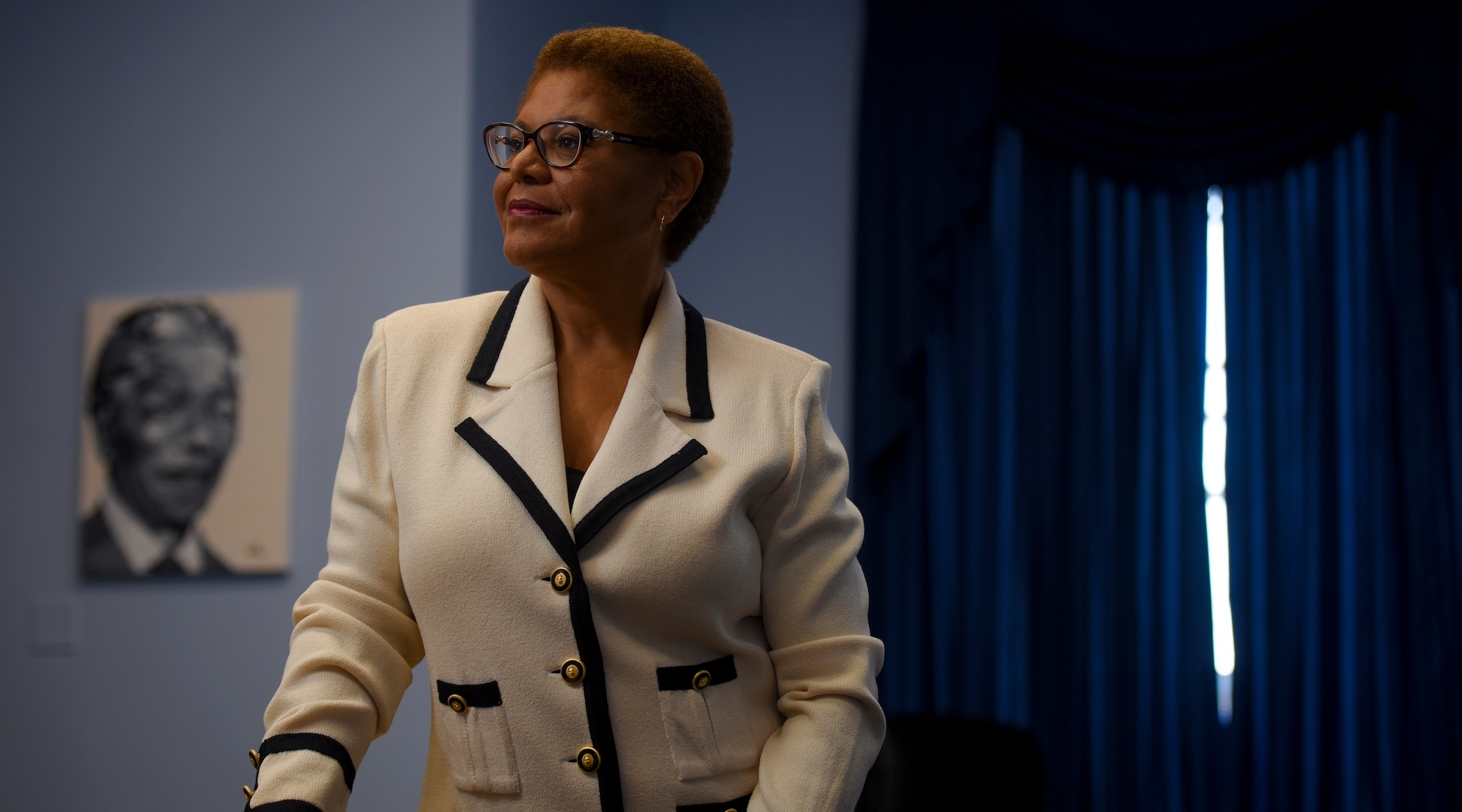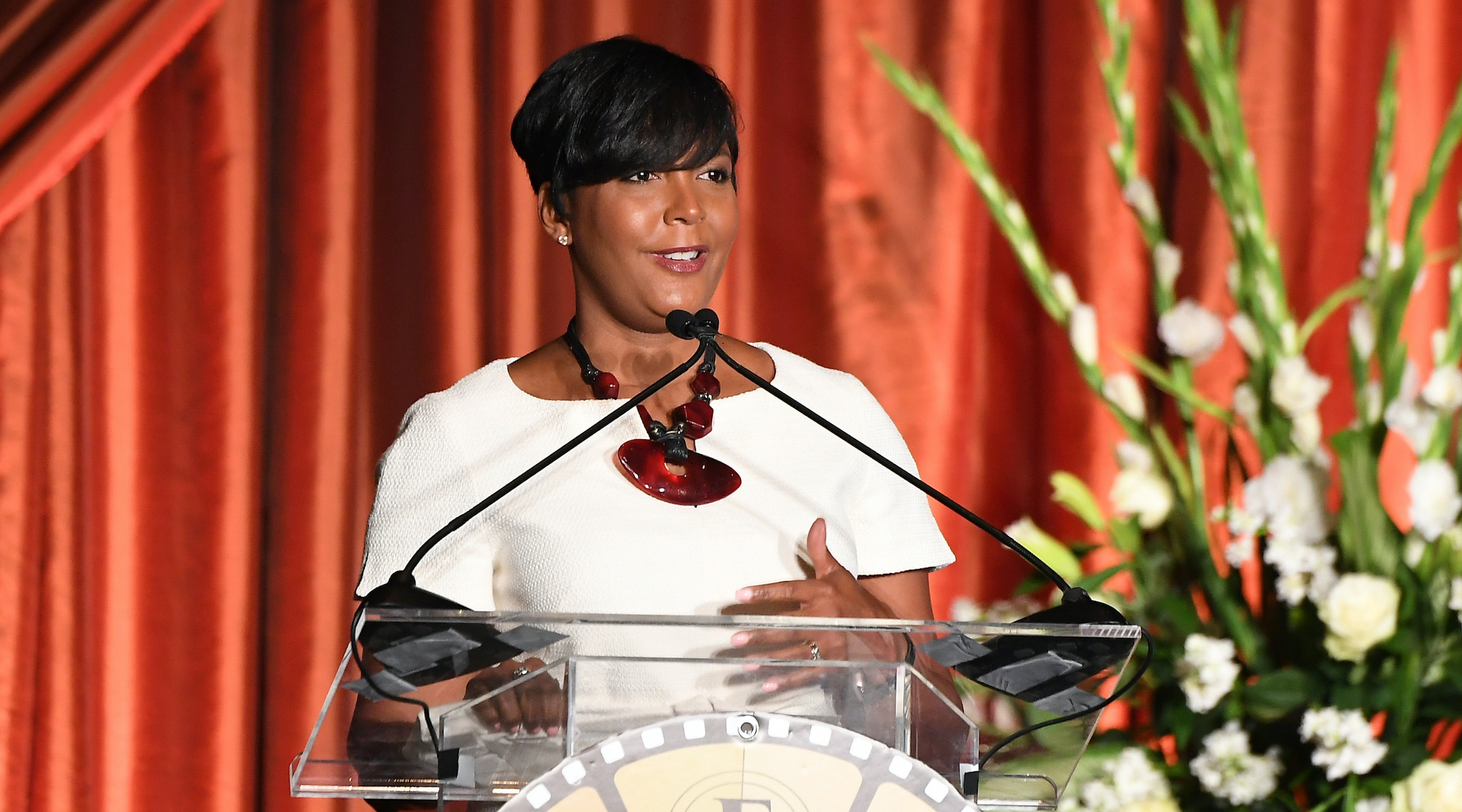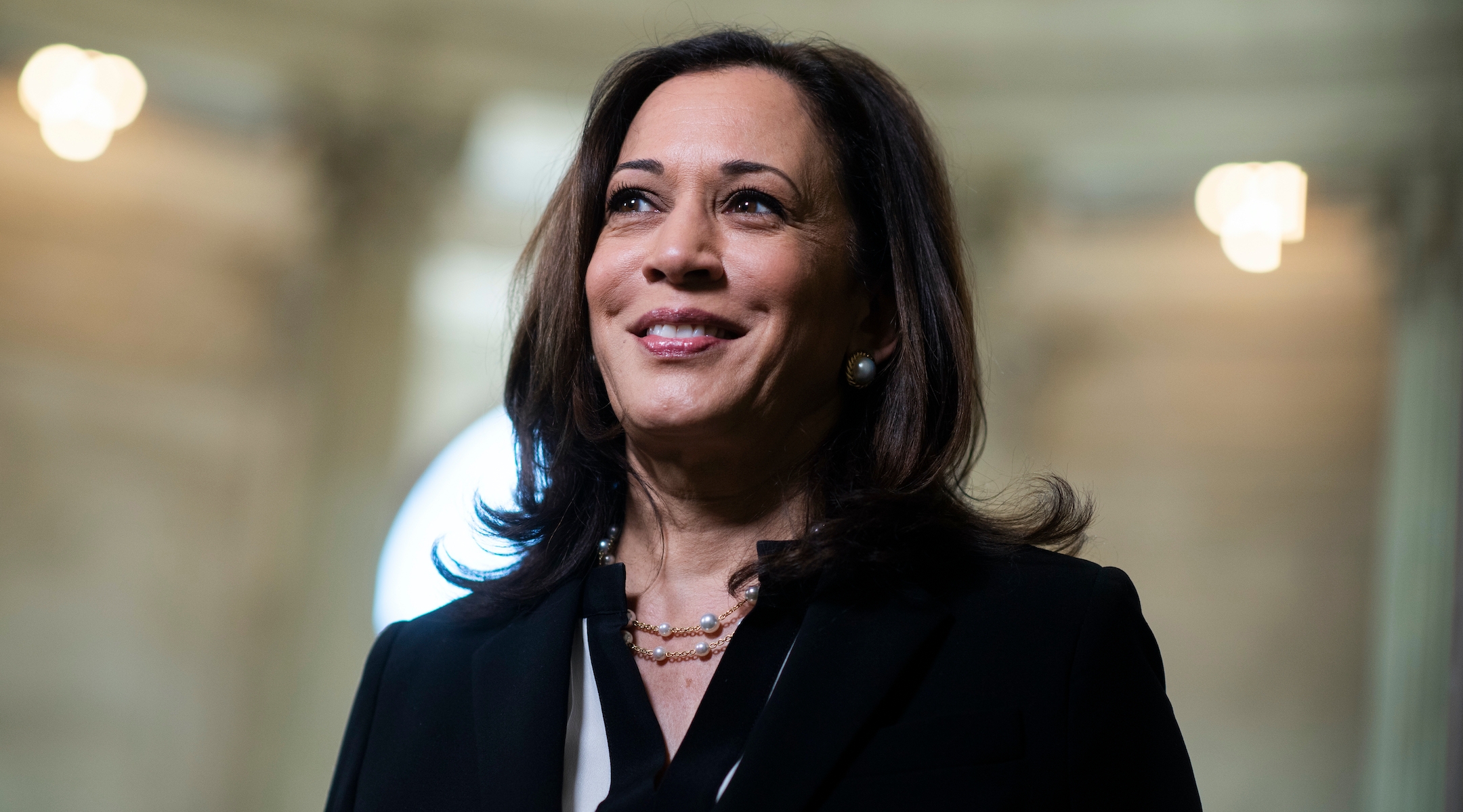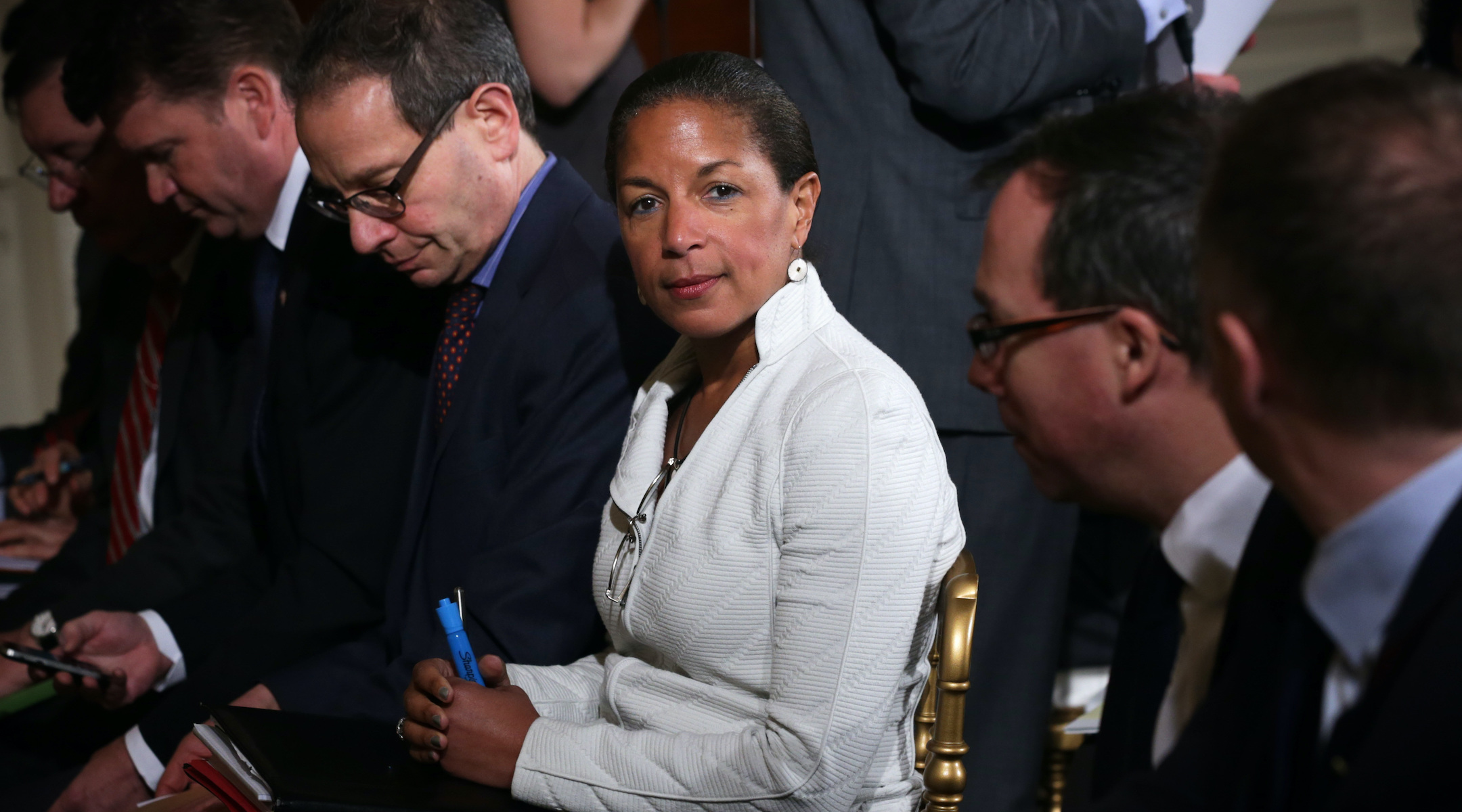A Jewish guide to Joe Biden’s VP short list – Advice from Jews for Jews – My Comments: Why I will miss Trump
[Here are Jews publishing their nonsense regarding Biden. I would be sad if Biden won and Trump could not be re-elected. We'll be 100% back to the normal. At least Trump mocked journalists. I will seriously miss Trump and his fake news. He was the only person who was spitting in their faces. He may have failed on everything else, but he was breaking the Mass Media's hold on people's minds. I can't stand the thought of more grovelling worthless dogs working with the Jewish Mass Media and the great institutions of lying. Look at this list of degenerates that the Jews are hoping for as Vice Presidents. I could puke. Jan]
WASHINGTON (JTA) — Democratic presidential candidate Joe Biden is expected to name his running mate in the next two weeks, and while the list of contenders has changed constantly for months, most reports have now whittled the group of front-runners down to Kamala Harris, Elizabeth Warren, Susan Rice, Karen Bass, Tammy Duckworth and Keisha Lance Bottoms.
In that list is a range of opinions on Israel policy, varying levels of history with the Jewish community and multiple other X factors of interest to Jewish-American voters. We’ve broken those down here in a guide (in alphabetical order) to why Biden could pick any of them — from a Jewish angle.
Karen Bass

Rep. Karen Bass in her office at the Rayburn House Office Building, July 30, 2020. (Jahi Chikwendiu/The Washington Post via Getty Images)
Background: The Los Angeles representative to the U.S. House of Representatives has the rare reputation of being a solid progressive who works well with Republicans. She is known for her preternatural calm, evident when as speaker of the California Assembly she worked with GOP Gov. Arnold Schwarzenegger during the 2008-10 financial crisis. Her background in Black civil rights activism would stir excitement among African-American voters.
On Israel: Bass, who chairs the Congressional Black Caucus, was protective of Rep. Ilhan Omar of Minnesota last year after Omar came under fire for comments that a large part of the pro-Israel community saw as anti-Semitic. Bass said that some of the attacks on Omar, a freshman Democrat, were Islamaphobic. But she also agreed that Omar’s insinuation that pro-Israel groups control Congress with money was “inflammatory” and “viewed as anti-Semitism.” Last summer, Bass co-authored a House resolution to voice support for the two-state solution after Israeli Prime Minister Benjamin Netanyahu promised in political campaigns that he would annex parts of the West Bank, which some believe would endanger the possibility of two states. This June, as Netanyahu edged closer to making annexation a reality, Bass came out strongly against the move and lobbied Republicans to support a letter opposing it.
Eyebrow raisers: Bass has lavishly praised the Castro regime in Cuba and the Church of Scientology. The support for a communist leader could concern some U.S. Jews who fled persecution in other communist regimes, such as the former Soviet Union and places in Latin America.
Fairfax connection: Bass has spoken about growing up with Jews in the historically Jewish Fairfax area of Los Angeles (it was badly damaged after some recent George Floyd protests) and making Jewish friends through civil rights activism. Her first encounter, she told the Jewish Journal, was when she turned up at school on Yom Kippur and was the only one there. “That’s how I contacted the Jewish community,” she said.
Her VP case: Bass has said she regrets those statements on Castro and Scientology, but they could harm Biden, particularly in Florida, with its large Cuban-American community that includes many Jews. Florida, home to one of the nation’s biggest Jewish communities, is not a must-win for Biden, but if he knocks Trump out there — and it looks like he has a chance — the president is finished.
Keisha Lance Bottoms

Atlanta Mayor Keisha Lance Bottoms speaks at the BronzeLens Film Festival Women Superstars Luncheon, Aug. 23, 2019. (Paras Griffin/Getty Images)
Background: The Atlanta mayor since 2017 has been given high marks for resisting Republican Gov. Brian Kemp’s anti-mask doctrines during the pandemic and for her sympathetic ear to Black activists. She also has been with Biden through highs and lows: At last year’s Democratic presidential debate in her city, at a time when Biden was down in the polls, she was his surrogate to reporters, forcefully making the presidential case for him.
On Israel: Managing Atlanta is a tough and maturing gig, but she has not developed substantial foreign policy chops. She did chair the drafting committee for the Democratic National Committee’s party platform this year, which hewed to a centrist outlook, calling on Israel’s government to stop settlement expansion but omitting any mention of the word “occupation.”
Jewish shout-outs: Her city has over 100,000 Jews, and she has delivered greetings on Jewish holidays. After the Pittsburgh synagogue massacre, Bottoms said that Atlanta stands with “our Jewish brothers and sisters around the nation.”
Her VP case: Bottoms is the most unknown to the Jewish community — and the wider political community — on Biden’s short list. But she has shown an ability while in the national spotlight to weather pressure and critique from progressives while strongly advocating for the Black community. And she has been a solid Biden advocate, signaling that she could back him up on Jewish issues.
Tammy Duckworth

Sen. Tammy Duckworth speaks at the 2019 AIPAC Policy Conference in Washington, D.C., March 25, 2019. (Cheriss May/NurPhoto via Getty Images)
Background: The Illinois senator is a military veteran who lost her legs in combat in Iraq. She has been outspoken and cutting in her criticism of President Donald Trump, coining the sobriquet “Cadet Bone Spurs,” an allusion to the dubious pretext Trump used to avoid the military draft. Like Biden, she is a centrist, and her legislative achievements are in the area of veterans’ affairs.
On Israel: Duckworth has been a solid AIPAC Democrat, making a point of publicizing her meetings with its activists at a time that some progressive activists were counseling a boycott. More recently, however, she was one of 18 senators who signed on to a letter that warned Netanyahu that his plans to annex part of the West Bank would “fray” U.S. bonds with Israel. That countered the centrist Democrat line that advocates for strong criticism of annexation while making clear that U.S.-Israel ties are sacrosanct. J Street has endorsed her.
Chicago Jews love her: “Senator Duckworth has been a great friend to the Jewish community and a champion on the issues they care about, from helping the widow, orphan and stranger, to ensuring a safe and secure Israel as a democratic, Jewish state,” Jewish House Rep. Brad Schneider told Jewish Insider. And this from Lauren Gash, a former Jewish member of the Illinois House: “Personally, I feel as an American Jew that she is the kind of leader we can trust to fight for Israel, and that matters to me.”
Her VP case: On paper, she does not bring the progressive balance to the ticket that the party’s left says is needed to galvanize the voters disappointed by the defeat of Bernie Sanders. And the conservative line on her is, as an Illinois Republican operative told Jewish Insider: “On issues in the Jewish community, [she’s been] absent or on the wrong side.” But her identity as both a woman of color and a decorated military veteran hints at the potential of intriguing a wide swath of voters.
Kamala Harris

Sen. Kamala Harris in the Russell Senate Office Building, June 24, 2020. (Tom Williams/CQ Roll Call/Getty Images)
Background: The California senator briefly led the presidential contenders in the polls in mid-2019 when she stood out in the crowded debates — in part by bashing Biden on his civil rights record. Her outspoken feminism and her blunt prosecutorial style on the Senate Judiciary Committee has earned her support from Hillary Clinton-style Democrats and some progressives, while her background as a prosecutor has made her vulnerable to attacks from others to her left.
On Israel: Despite her progressive bona fides, Harris is a staunch pro-Israel liberal who is more AIPAC than J Street — in fact, J Street, the liberal Israel lobby, has never endorsed her, despite the fact that they endorse more than half of Senate Democrats. She pushed back against claims in 2019 that she was boycotting the American Israel Public Affairs Committee by releasing a picture posing with its conference activists. She backs a two-state solution and says that “a resolution to this conflict cannot be imposed” on Israelis or Palestinians. Harris isn’t just talk, though: She also co-sponsored a Senate resolution in early 2017 that essentially rebuked the Obama administration for allowing through a U.S. Security Council resolution condemning Israel’s settlement policies.
She has already broken some glass: She married Jewish lawyer Douglas Emhoff in 2014. His Twitter feed can get sappy about her, in a good way.
Blue box connection: “So having grown up in the Bay Area, I fondly remember those Jewish National Fund boxes that we would use to collect donations to plant trees for Israel,” she said at the AIPAC conference in 2017. “Years later when I visited Israel for the first time, I saw the fruits of that effort and the Israeli ingenuity that has truly made a desert bloom.”
Her VP case: On paper, Harris is very aligned with Biden, who is also a centrist Israel defender, on Israel policy. By picking her, Biden could rest easy on that front while earning some points with progressives who are not thrilled by his record.
Susan Rice

Susan Rice, then the national security adviser, sits in the audience of a joint news conference conducted by President Barack Obama and British Prime Minister David Cameron in the White House, Jan. 16, 2015. (Alex Wong/Getty Images)
Background: Rice is a veteran diplomat and White House adviser who has served as the U.S. ambassador to the United Nations, President Barack Obama’s national security adviser and foreign policy adviser to multiple other Democratic presidential nominees. Her strength, clearly, is in international relations. Republicans associate her with the controversy that followed the 2012 attack on the U.S. consulate in Benghazi, Libya, and she has since then been a lightning rod for critics of Obama’s foreign policy failures.
On Israel: Rice got high marks from the pro-Israel community for defending Israel during her tenure as ambassador to the United Nations from 2009 to 2013, and she has said that countering hostility to Israel took up the largest part of her time at the body. But those plaudits might not resonate so much these days — the Israel advocacy of Rice, or almost any past U.S. ambassador to the body, pales next to the closeness that Trump’s first envoy, Nikki Haley, has forged with Israel and the pro-Israel community. If she is selected, Rice will also have to explain the U.S. abstention in December of 2016 on a U.N. Security Council vote to condemn Israel’s settlements. As national security adviser, she was the person who called then-Ambassador Samantha Power instructing her not to use the U.S. veto to kill the resolution.
Darfur defense: Rice is especially close to the Reform movement, having worked with it to expose the genocide in Sudan.
Her VP case: From a non-Jewish political standpoint, Rice brings a wealth of experience handling the entire machinery of government. But Politico reports that Republicans hope Biden chooses her because they believe her associations with Obama, Hillary Clinton and Benghazi would rev up their base. Those connections with Obama extend to the Jewish arena — Jewish voters might see her as a continuation of the Obama-era foreign policy school. For pro-Israel Jews who were not pleased with the friction between Obama and Netanyahu, that could be a liability.
Elizabeth Warren

Sen. Elizabeth Warren speaks at a presidential campaign rally in Detroit, March 3, 2020. (Jeff Kowalsky/AFP via Getty Images)
Background: The progressive Massachusetts senator has built a big base of support thanks to her rigorously detailed policy stances, her persistence in taking on corporate interests and her commitment to tackling feminist issues. Early on in the presidential campaign, she was a leading candidate.
On Israel: Warren is pro-Israel and firmly believes in Israel’s right to exist and defend itself. In an Jewish Telegraphic Agency op-ed in February, she wrote that she is “committed to Israel’s security and safety.” But she added: “At the same time, branding all criticism of Israel as automatically anti-Semitic has a chilling effect on our public discourse and makes it harder to achieve a peaceful solution between Israelis and Palestinians.” Due to her strong disagreements with Netanyahu policy and Israel’s treatment of Palestinians, Warren said she would consider conditioning assistance to Israel to influence that policy. She also boycotted this year’s AIPAC conference. She disagrees with the boycott Israel movement, but a member of her presidential campaign, Max Berger, helped found the anti-occupation group IfNotNow and tweeted in 2017 that he “agree[s] with BDS.” Warren as a senator is endorsed by J Street.
Close with the locals and immigrants: After a gunman killed 11 worshippers at the Tree of Life synagogue in 2018, Warren joined the American Jewish Committee initiative called “Show up for Shabbat” and spoke at Temple Emanuel in Newton, Massachusetts. Her official presidential campaign Twitter account tweeted about several Jewish events: twice in the wake of Pittsburgh, and once each after the Chabad of Poway shooting, the Halle synagogue shooting in Germany, on Yom Hashoah (Israel’s Holocaust Remembrance Day) and on U.S. Holocaust Memorial Day.
Warren also pledged during the January 2019 government shutdown to donate her wages to HIAS, the leading Jewish group dealing with immigration issues and the victim of a social media attack by the Tree of Life gunman before the attack.
Her VP case: In terms of winning the Jewish vote, choosing Warren likely wouldn’t net Biden too much — many of Warren’s liberal Jewish supporters will likely swallow the moderate pill and vote for Biden regardless of who is on his ticket. Picking Warren could raise questions about his steadfastness on Israel and other foreign policy.

